- From Faith Current: “The Sacred Ordinary: St. Peter’s Church Hall” - May 1, 2023
- A brief (?) hiatus - April 22, 2023
- Something Happened - March 6, 2023
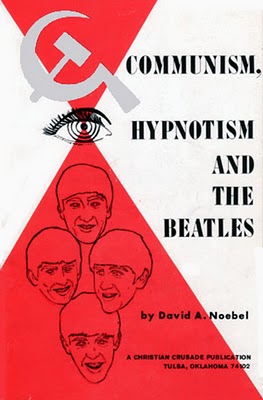
You forgot “Fluoridation”
This afternoon, while trolling the internet for something to listen to while I was in the bath, I stumbled upon this podcast from rockcritics.com, which proved to be a very interesting roundup of Beatle tomage by Tim Riley, author of Tell Me Why (and a bio of John Lennon which I will doubtless purchase and read).
Our own D. McKinney is singled out and glorified, rightly so. Anybody reading Dullblog who hasn’t read Magic Circles should go do so immediately.
I move we should assemble a essential Beatle Bookshelf. Any seconds?
PS–In finding the photo for this post, I stumbled across this blog. No communication is safe from this kind of thinking. It’s totally insane, which is why I feel perfectly safe inserting no less than 180 hidden references to Satan, sun worship, freemasonry, and the occult into this post. (Hint: #1 is “Dev” in the title; you only THINK it’s short for “Devin.” #2 is also “Dev,” a male Indian name, Indians being pagans and thus Satan-worshippers.) Why 180 clues? 6+6+6+0=number of the Beast! Or is it “the Beats”?

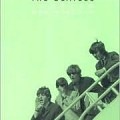


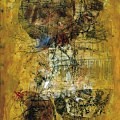


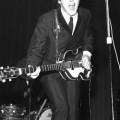
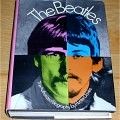

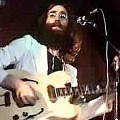
Because I’m perverse (though not Satanically so), I’m gonna stand your suggestion on its head and make an anti-suggestion (but not an anti-Christ suggestion) – i.e., a Beatles book to avoid reading; which would be …
Geoff Emerick’s Here, There and Everywhere.
You’d think a book by one of the Beatles’ recording engineers would be great, but Emerick’s book is not merely disappointing, it is out-and-out untrustworthy. It gets empirically verifiable facts wrong, and I don’t mean just obscure ones. I think every Beatles fan knows that the advance promo copy of “Penny Lane” contained extra trumpet notes at the end that were edited out for the official release. In Emerick’s version of this event, he claims the exact opposite: That the promo version didn’t have the extra notes, but they were added back in for the official release.
There are quite a few errors of fact such as this. That is not such a big deal, I guess. But it kinda gives you an idea about GE’s level of trustworthiness, which really is an issue when he describes things that you can’t refute or verify just by listening to an album or a song.
The main thing that I found just not credible is GE’s portrayal of George as, essentially, a borderline-incompetent guitarist until at least 1967. In Emerick’s telling, George is forever effing leads up, even not particularly challenging ones, requiring re-take after re-take and production tricks to cover up his “clams”, as I believe GE calls them.
Emerick disputes that this is how George comes off in his book, but Ken Scott, another engineer for the Beatles, also pointed this out. It may well not have been GE’s intent to libel George thus, but it seems clear he does.
Allegedly, the factual errors were going addressed in a future edition; with some of them, it’s mind-boggling they didn’t get caught in the first edition. I mean, okay, Emerick forgets which version of “PL” had the notes at the end … but who was editing his book? Some guy who listens only to Mantovani? I mean, if you’re editing the autobio of a guy who fought at Pearl Harbor, you’re not just allowed to stop him and question his memory when he claims the Germans bombed Pearl Harbor … you’re pretty much required to. And if you don’t know who bombed Pearl Harbor, how, exactly, did you get the job of editing that book?
Because I’m perverse (though not Satanically so), I’m gonna stand your suggestion on its head and make an anti-suggestion (but not an anti-Christ suggestion) – i.e., a Beatles book to avoid reading; which would be …
Geoff Emerick’s Here, There and Everywhere.
You’d think a book by one of the Beatles’ recording engineers would be great, but Emerick’s book is not merely disappointing, it is out-and-out untrustworthy. It gets empirically verifiable facts wrong, and I don’t mean just obscure ones. I think every Beatles fan knows that the advance promo copy of “Penny Lane” contained extra trumpet notes at the end that were edited out for the official release. In Emerick’s version of this event, he claims the exact opposite: That the promo version didn’t have the extra notes, but they were added back in for the official release.
There are quite a few errors of fact such as this. That is not such a big deal, I guess. But it kinda gives you an idea about GE’s level of trustworthiness, which really is an issue when he describes things that you can’t refute or verify just by listening to an album or a song.
The main thing that I found just not credible is GE’s portrayal of George as, essentially, a borderline-incompetent guitarist until at least 1967. In Emerick’s telling, George is forever effing leads up, even not particularly challenging ones, requiring re-take after re-take and production tricks to cover up his “clams”, as I believe GE calls them.
Emerick disputes that this is how George comes off in his book, but Ken Scott, another engineer for the Beatles, also pointed this out. It may well not have been GE’s intent to libel George thus, but it seems clear he does.
Allegedly, the factual errors were going addressed in a future edition; with some of them, it’s mind-boggling they didn’t get caught in the first edition. I mean, okay, Emerick forgets which version of “PL” had the notes at the end … but who was editing his book? Some guy who listens only to Mantovani? I mean, if you’re editing the autobio of a guy who fought at Pearl Harbor, you’re not just allowed to stop him and question his memory when he claims the Germans bombed Pearl Harbor … you’re pretty much required to. And if you don’t know who bombed Pearl Harbor, how, exactly, did you get the job of editing that book?
Okay, I got that “comment too long” message like three time, so you either go my last comment 3 times, or not at all.
I think this blog hates me.
Geoff Emerick isn’t one of the contributors to this blog, is he?
HT&E has been sitting on my shelf unread for several years now, and Glaven, you make me glad of it!
Emerick’s book was probably one of 12 or something that his editor was editing. In the US, that editor was probably 30 years Emerick’s junior, and unlikely to take The Beatles’ Engineer to task. Finally, and most importantly, there’s simply not enough money to pay people to comb through the book.
This reality is why I am self-publishing books like LAD, which I am sure could’ve appeared conventionally. That’s pure idiocy on my part, from a financial perspective–but having worked on it for 3 years, I wanted to make sure it wasn’t ruined. One of my books has been; another I had to fight for so bitterly, it was basically orphaned by the publisher, in the face of hundreds of thousands of lost sales. But corporate publishing is what it is–you take that advance, and they’re in charge; and their interests are not the same as the author’s, or the readers’.
Publishers simply do not provide the kind of project support that they used to–the only person with that level of investment in a project is the author. So if you want really high quality books on things like The Beatles, buy LAD and self-published stuff by scholars, because those sales will lead to conventional deals and conventional exposure and big enough advances that allow writers to live and write more books. It’s only AFTER readers express interest that commercial publishers can afford to give a damn.
If Geoff Emerick wants to write a book, the only question is, “Can he write?” and if he can’t, how much the ghost will cost; and then what the P&L says you can pay GE as an advance. Corporate publishing is like soda pop; if you make more money with high fructose corn syrup, out goes the cane sugar, whether it tastes better or not. That’s not a moral judgment on people who work in corporate publishing, just a clarification of the rules of that game for those of us not in it. Getting that Penny Lane fact is only important if the money you spend on the Beatle-specific fact checker is reflected in increased revenue. The short-term answer is, it won’t be, so the book doesn’t get fact-checked.
My first real Beatles book, and probably the most influential for me, was William J. Dowdling’s Beatlesongs. It’s just a catalog of every song: who wrote it (he worked out a decimal system for attributing composition credit), who played what instrument, and who commented on it elsewhere. The “remarks” are a little heavy on John Lennon’s crabby 1980 Rolling Stone interview responses — not till I saw those answers in context (with the subtext This is not what I want to talk about) did I understand why he sounded so down on everything. And all of that information is probably on Wikipedia now. But Beatlesongs did a lot to encourage my obsessions in pre-Internet days, and I still consult it now and then.
Mollie, I LOVED that book! I own it, but the wife has it packed away in a tub somewhere! How could you NOT love a book that informs you that George’s Mom was the Ur-source for the line “What they need’s a damn good whacking” in Piggies and then GIVES LOUISE HARRISON PARTIAL WRITING CREDIT?!
Other unusual credits: Thomas Dekker (“Golden Slumbers”); Donovan (“Yellow Submarine”); Kahlil Gibran (I can’t bloody remember what for).
That book was a great read!
Michael, Agreed. The state of corporate publishing is pretty sad. But Emerick’s book also had a music journalist co-author (Howard Massey). Balls were dropped all around. A real shame.
The Kahlil Gibran credit was for Julia… John pretty much knicked “half of what I say is meaningless.”
There are many books I love, but one of the newer ones I have thoroughly enjoyed is Liddypool by David Bedford. I find their early history the most fascinating, and this book has interesting details and fab photos.
Glaven,
Don’t know why you have it in for Geoff Emerick — one of the most beloved and influential engineers in the business — but the “empirically verifiable fact” that you cite does not appear in my copy of the book, which is a second printing. I remember the whole brouhaha when Emerick’s book first came out and Ken Scott attacking him publicly and, IMO, viciously (old feuds dying hard?), but Ken’s allegations were based on a prepublication review copy that he somehow got ahold of. For those of you not in the publishing business (and I’m sure Michael can verify this), these are short print run limited editions run off at the galley stage, before the author(s) have a chance to do final proofing, in order to solicit early reviews and back-cover blurbs. Scott and his online cronies had no business attacking Emerick’s book on the basis of such a draft, which often has typos and other kinds of errors that haven’t yet been fact-checked, and I think that brings into great doubt Scott’s veracity (and motivation).
For what it’s worth, I didn’t get the sense that Emerick was attacking George Harrison personally anywhere in the book. If you listen to the many Beatles bootlegs flying around out there, there’s plenty of verifiable proof that, at least in the early days (which Emerick was witness to), Harrison did indeed have a great deal of difficulty getting through a solo without making a flub or two, often to the amusement (or irritation) of Lennon and/or McCartney. That probably explains why some of Harrison’s best-loved solos (such as in his own songs Taxman and While My Guitar Weeps) were actually played by others (McCartney played the former and Eric Clapton the latter). So I took his comments about Harrison as refreshing honesty, not editorializing, and Emerick does go out of his way to describe Harrison’s evolution in the later Beatle years, giving him full props for his contributions to the Abbey Road album, and for Harrison’s skills as a producer.
All in all, I took Ken Scott’s criticisms as nothing more than sour grapes, coming from a jealous colleague who contributed far less to the Beatles recorded legacy than did Emerick. (Scott only ever recorded a few tracks for Magical Mystery Tour and two-thirds of the White Album, when he replaced Emerick, who quit because of tensions in the sessions — and was never asked back to do any work on future Beatles albums. In fact, Scott only ever worked with Harrison as a solo Beatle, which gives you the sense that he wasn’t all that popular with the other three.) Emerick, on the other hand, was asked back to record Abbey Road, and went on to work with all four ex-Beatles after the breakup, including many albums with McCartney.
So, Michael, I think you should perhaps consider taking Here, There, and Everywhere off your shelf to give it a read so you can make up your OWN mind about it.
I should point out that I have no feelings one way or another about Geoff Emerick or Ken Scott. I will add here that the version of Here, There and Everywhere that I read was not a galley and it most certainly did still contain the error about “Penny Lane” along with quite a few other errors of fact. If Ken Scott’s criticisms of the first edition of the book helped to get those risible and inexcusable errors corrected in subsequent editions, I fail to see how this somehow redounds to Emerick’s credit and somehow undermines Scott’s credibilty.
It is simply untrue – an error of fact – that Scott’s criticisms were based solely on a galley proof. He read the galley, and alerted the publisher as to the errors; then he checked the published version to see if the errors were still there, and found that they had not been corrected. Scott himself claimed that he had been looking forward to Emerick’s memoir but was appalled to see how slipshod and error-riddled it was. It’s possible he was being disingenuous when he said that and that he’d just been biding his time for 40-odd years and saw the publication of H, T & E as his opportunity to requite Emerick for some wrong that commenter John seems to know about but that I myself don’t. I assure you that I have no grudge against Emerick and my view of the worth of his book is based on nothing other than reading it with an open, yet critical, eye, which is how I try to read everything.
I stand by my assessment of Emerick’s characterization of George; I had no problem believing George may have had his share of problems in the very early years; but it got increasingly difficult to believe Emerick’s characterization of “dour” and humorless George’s borderline-incompetence as you got to years 1965, 1966 and 1967.
Michael (and anyone else) is, of course, welcome to read the book. I have no vested interest in preventing him. My only point was that there are tons of Beatle books out there and here was one that, in my view, was unreliable and not worth wasting time on. I didn’t go into reading the book with that view of it – why on earth would I have read it if I had? and how would I have had any view of the book without reading it? (unless, of course, I’m Ken Scott’s sockpuppet) – and I discovered Ken Scott’s criticisms only after I read the book and was already flabbergasted by some of the things the book claimed. Scott’s views, in some cases, merely confirmed what I already thought after reading the book. I don’t agree with everything Scott said.
But I still believe Here, There and Everywhere is pretty piss-poor and not worth reading.
I should point out that I have no feelings one way or another about Geoff Emerick or Ken Scott. I will add here that the version of Here, There and Everywhere that I read was not a galley and it most certainly did still contain the error about “Penny Lane” along with quite a few other errors of fact. If Ken Scott’s criticisms of the first edition of the book helped to get those risible and inexcusable errors corrected in subsequent editions, I fail to see how this somehow redounds to Emerick’s credit and somehow undermines Scott’s credibilty.
It is simply untrue – an error of fact – that Scott’s criticisms were based solely on a galley proof. He read the galley, and alerted the publisher as to the errors; then he checked the published version to see if the errors were still there, and found that they had not been corrected. Scott himself claimed that he had been looking forward to Emerick’s memoir but was appalled to see how slipshod and error-riddled it was. It’s possible he was being disingenuous when he said that and that he’d just been biding his time for 40-odd years and saw the publication of H, T & E as his opportunity to requite Emerick for some wrong that commenter John seems to know about but that I myself don’t. I assure you that I have no grudge against Emerick and my view of the worth of his book is based on nothing other than reading it with an open, yet critical, eye, which is how I try to read everything.
I stand by my assessment of Emerick’s characterization of George; I had no problem believing George may have had his share of problems in the very early years; but it got increasingly difficult to believe Emerick’s characterization of “dour” and humorless George’s borderline-incompetence as you got to years 1965, 1966 and 1967.
Michael (and anyone else) is, of course, welcome to read the book. I have no vested interest in preventing him. My only point was that there are tons of Beatle books out there and here was one that, in my view, was unreliable and not worth wasting time on. I didn’t go into reading the book with that view of it – why on earth would I have read it if I had? and how would I have had any view of the book without reading it? (unless, of course, I’m Ken Scott’s sockpuppet) – and I discovered Ken Scott’s criticisms only after I read the book and was already flabbergasted by some of the things it claimed. Scott’s views, in some cases, merely confirmed what I already thought. I don’t agree with everything Scott said.
But I still believe Here, There and Everywhere is pretty piss-poor and not worth reading.
Got that “too long” message again. So my last comment probably was posted three or four times?
Sigh.
“Risible and inexcusable”?
I am floored. Even if — and let’s assume the worst (as Ken Scott did) — Geoff Emerick somehow managed to forget which version of Penny Lane had the piccolo trumpet flourish at the end and which didn’t, do you really think that this is a “risible and inexcusable” error?
Puh-lease. Let’s put things in some perspective here. I’d be willing to wager that if you asked Paul McCartney today which version was done when, he’d be hard-pressed to remember. The Fab Four’s own firsthand memories of events that occurred to *them* was pretty spotty at best, as evidenced by The Beatles Anthology coffeetable book that came out some years ago. Doesn’t make the book any less enjoyable or readable, and certainly doesn’t diminish their talents OR credibility one iota.
And you may not like what Emerick had to say about George Harrison, but I believe he gave an honest portrayal as how HE saw the man, which is all you can ask for in a memoir. His perspective was certainly subjective, but I daresay his take on Harrison in those years is more credible than Ken Scott’s, for one simple reason: he was there, working with them in the years before Scott was.
So unless you can demonstrate that you were somehow lurking in the back of the control room when these events went down, Mr. Glaven Q. Heisenberg, I for one will choose to take Geoff Emerick’s credibility over yours. Even if you somehow feel you are performing some kind of public service by warning people off of his book.
“Beatlesongs” is one of my favorites, too, along with Steve Turner’s “A Hard Day’s Write,” which similarly gives some of the background to the Beatles’ song (though in Turner’s case, more focused on the song’s meaning than the details of who wrote what). For analysis of how and why the Beatles’ music works, I like Tim Riley’s “Tell Me Why” and Ian MacDonald’s “Revolution in the Head.”
I was surprised by just how good Mojo’s “The Beatles: Ten Years That Shook The World” is. It’s a great starting point for anyone interested in the band, since it gathers so much information in an accessible way. One of the best recent books on the Beatles is Peter Doggett’s “You Never Give Me Your Money,” which focuses on the breakup and its aftermath.
I wish that W. Fraser Sandercombe’s “Beatle Books: From Genesis to Revolution” were annotated, because it would be great to have a relatively comprehensive list of Beatles-related books that also gave some idea of the books’ focus and merits.
Well, Nancy, maybe we should do a list like that?
I’ll see if I can figure out how to make up a static page.
That would be great, Michael — a DullBloggian Beatles bibliography, Wikipedian style. The tough part would be annotating books that produce polarizing reactions (like Geoff Emerick’s, apparently). Maybe there could be three categories: highly recommended, recommended with dissenting opinions, and not recommended? Or individuals could review books they recommend, and others could leave comments?
It all depends on what people want, Nancy. I personally would be satified with something like this:
Biographies
Davies, Hunter–The Beatles (1968)
Though superseded in some ways by books that came after (Lennon called this book out for offering a sanitized version of events), Davies’ book remains valuable, precisely for being one of the few books written about the group while it was still functioning.
We could do it as posts, perhaps, with discussion of the book in the comments of each post?
I’ll see if Blogger will let us run a blog-within-a-blog like this.